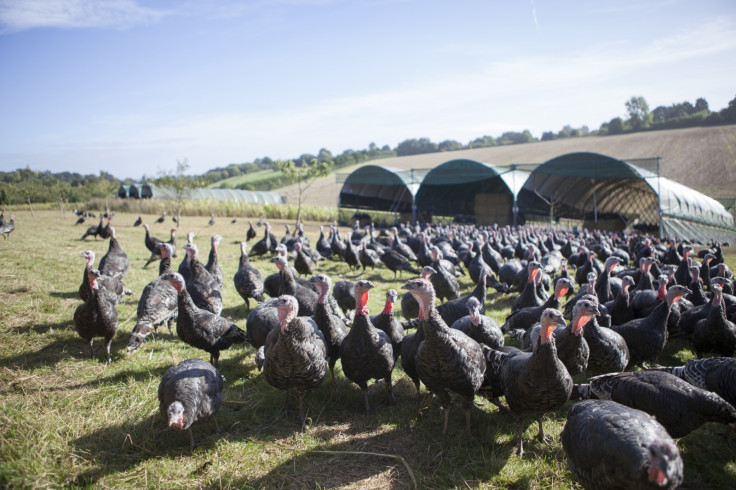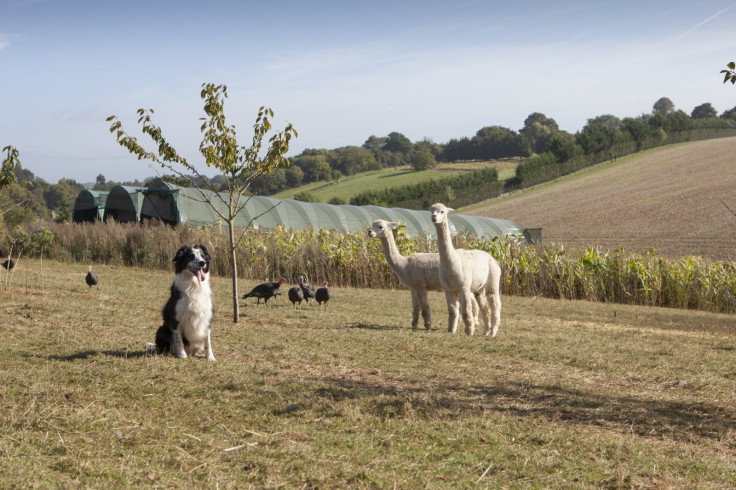Full moons, alpacas and nightly fireworks: The weird world of turkey farming
It doesn't take much to spook a gang of turkeys.

In Cookham Dean, Berkshire, Copas Turkeys have been rearing Christmas dinners since 1957. If you're passing by in the weeks up to November, alongside thousands of turkeys and a few alpacas, you might get to see a fireworks display. Farm Manager, Steve Hellings, is setting them off every day.
As it gets closer to fireworks night, the daily show will get bigger and louder, it will also get later. For turkey farmers like Hellings, one of the biggest problems is making sure the frightful birds don't get spooked. "We keep going into the night time," Hellings tells IBTimes UK, "so that by the time fireworks night arrives, they just basically are enjoying the show."
"We're at the stage where we're still letting them off around dusk so this week and next week we'll be ramping it up and they'll be fully acclimatised to all the noise and bangs."
Hellings says that turkeys are essentially herd animals, so if one gets spooked and runs, they all follow. "They'll run to the corners in their sheds and they'll suffocate each other," he says, and those that don't die will be left with scars and scratches.
So you don't want to spook the turkeys, but here's the thing: A lot of stuff spooks turkeys. Take, for example, full moons. Hellings has to plan for full moons, "when you've got a full moon, it casts shadows so that can upset the birds," he says.
When driving around at night, the team will sometimes flash lights at the birds – not for countryside high-jinks, but because there are footpaths through the farm and walkers with torches could scare the birds and lead to a frenzy. "We just try and acclimatise them to every eventuality that can arise," says Hellings.
Sometimes he'll let off his shotgun: "I can shoot the shotgun in the yard and judge the turkey's reaction and calm them down if need be."
And how do you calm down a turkey? "We talk to them. Because I'm in the sheds three or four times a day and with the turkeys and they know me, they know my voice, and you just talk to them, just like you would to a dog that's scared of the fireworks, just reassure them."
Along with preparing for fireworks night, the farm is starting to get ready for the Christmas period, where their staff with go from 20 to around 200. With all the extra activity that's coming, the turkeys are getting a dose of Kiss radio each morning so they get used to the background noise: "if you've got people shouting and screaming and stuff that can upset the turkeys so we'll play the radio just to get them used to the noise really."
And while all of this is happening, there are alpacas keeping watch. If alpacas seem like an odd choice for guard animal, they're not. "They get very territorial, so if you put them in a field they will protect that territory," says Hellings, "we have two in each field and they will sit back to back and they've got really good eyesight."

He's even seen them chase out a fox: "They were chest out, head up, trotting over to it, and it ran out."
The turkey's have their next test that afternoon. "In about 10 minutes we've got a group of schoolchildren coming down," says Hellings, "high pitched screams can upset the turkeys so we're about to test the theory."
But with all the preparation, the attempts to make the turkeys fine with shocks, you can't really prepare for how they're going to fare. Whatever you do, turkey farming is taking each day (and each new turkey fear) as it comes: "Something that upset the turkeys one day, they won't take any notice of the next day, so it's quite a strange way to react."
© Copyright IBTimes 2025. All rights reserved.




















